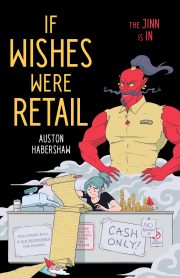In Space, There’s Actually Lots to Hear: Science Fiction Audio Drama
by Emma Johanna Puranen
It seems like everyone’s listening to things these days. Between the larger podcast boom and the rise of the audiobook, it can be easy to overlook the small but thriving world of science fiction audio drama.
Audio drama, which evolved from the radio play, is a storytelling medium in which the tale is told using nothing but dialogue, music, and sound effects. It’s intimate—the words are spoken right into your eardrums—and spare. But within this spareness lies its power: the best fiction leaves gaps that you, the person experiencing the story, expand upon with your imagination. Audio drama invites you to fill in the set yourself.
Compared to other methods of publication, there are relatively few barriers to entry when it comes to creating and distributing an audio drama. With a script, a decent microphone, actors, and some practice with sound design software, a relative novice can make a riveting, high-quality production—I know, because I’ve done it. Today, I’m going to tell you my top picks of science fiction shows from a variety of audio drama creators (including my own first foray into this medium!). All of these shows are indie, made by individuals or groups of friends with an idea. They’re all set in space, demonstrating the strength of the audio medium for stories in which crackling transmissions are all that connect lonely ships through the void.
Wolf 359: Starting out as the irreverent communications log of an officer on a space station, this sweeping space mystery grows from a single narrator to a full-cast show and from a comedy to a commentary on capitalism. Easily the most well-known show on this list, Wolf 359 kicked off the current crop of SF audio dramas for a reason.
Midnight Burger: In the science fiction tradition of Doctor Who, Midnight Burger combines past and present in its setting: a time-traveling diner that visits a new corner of time and space each day. Inside, enjoy a Reuben and a cup of coffee, as old-timey 1920s Arkansas radio evangelists serenade you. Open the door, and you might find yourself in the midst of an alien war.
The Strange Case of Starship Iris: In the future, humanity has suffered through a horrible war with extraterrestrials. A young scientist survives the destruction of her spaceship guided only by a mysterious voice-over comms. The story follows a found family in a rogue spaceship as they decipher alien messages, sing songs, and take down corrupt establishments.
We Fix Space Junk: Taking inspiration from The Hitchhiker’s Guide to the Galaxy, this comedy features the exploits of an odd-couple pairing of a smuggler and a disowned heiress as they take on any work they can find to escape their debts. It’s got science fiction staples like cryosleep and AIs, and it makes excellent use of its corpocratic future setting to include in-show news segments and advertisements.
ROGUEMAKER: My own show was inspired by the importance of long-distance communications in my social life during the pandemic. ROGUEMAKER is about the passengers and crew of an interstellar flight who are stuck in escape pods after their ship mysteriously explodes. In the pods, all they have for company are radios that don’t always work and a glitchy AI that can’t hear them. Part comedy, part pseudo-musical, part existential drama, ROGUEMAKER is ultimately a mystery puzzle box about the trials and tribulations of communication.
Spectre: More than many other entries on this list, Spectre touches on the military science fiction genre, and with a critical eye. Our mysterious protagonist Rho seems to have been made into a super-soldier, and when she is picked up by a suspicious spaceship with a friendly but tight-lipped crew, we slowly regain her memories along with her.
Second Star to the Left: This story’s framing device is the log of a scout explorer preparing an exoplanet for settlement, as well as her chats with her faraway scout-minder—the only person she is in real-time contact with. This relatively simple premise and the show’s excellent use of fairy tales lure the listener in, so we are fully invested when the relationship between the main characters deepens and the two must face a wider conspiracy together.
The Vesta Clinic: Presented as a sort-of anthology of medical logs connected by a wider story arc, The Vesta Clinic uses a common and powerful format for audio drama. Each episode is a medical file dictated by a doctor at an asteroid clinic to her robot assistant, who communicates only via beeps—leaving much to the imagination, not unlike R2-D2. (He’s also sassy like R2-D2). Dr. Underwood’s diagnoses of alien ailments are compassionately thought through, and a premise that sounds low-key becomes loving, emotionally impactful, and an intensely life-affirming experience.
All of the above can be found free-to-listen on most podcast apps, such as Apple Podcasts, Pocket Casts, Google Podcasts, Spotify, and more!
I’ve titled this blog with a tongue-in-cheek riff off the Alien tagline, but I do want to highlight that it is precisely the quality of space that makes it unable to carry sound—its emptiness—that makes it such a good setting for audio drama. All of these shows have taken the inherent loneliness and distance of space and had their characters overcome it, haltingly and laboriously at times, to prove the power of a lone voice in the vacuum. This power can impact your own writing practice as well—while some audio dramas have narrators, none of the ones on this list do. Audio drama writing therefore requires communicating invisible actions and environments to your listeners through dialogue. Studying how these stories are crafted is an excellent way to brush up on your dialogue writing. If you haven’t yet tried a science fiction audio drama, I urge you to give one a listen—it will show you a new side of what science fiction is capable of.
 Emma Johanna Puranen (@spacesword13) is a Scotland-based astronomer, LARPer, and SF writer. She’s working on an interdisciplinary Ph.D. using data science to understand science fictional portrayals of exoplanets. She’s the editor of the exoplanet anthology Around Distant Suns (reviewed in Nature Astronomy!) and the creator of the audio drama ROGUEMAKER.
Emma Johanna Puranen (@spacesword13) is a Scotland-based astronomer, LARPer, and SF writer. She’s working on an interdisciplinary Ph.D. using data science to understand science fictional portrayals of exoplanets. She’s the editor of the exoplanet anthology Around Distant Suns (reviewed in Nature Astronomy!) and the creator of the audio drama ROGUEMAKER.


